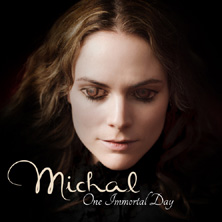 Back in 2000, when she released Sky With Stars on Columbia
Records, Michal Towber was primed for musical greatness. Michal
was signed to Columbia and released Sky With Stars in 2000.
Shortly thereafter, with the rise of Napster, the music industry changed
drastically and permanently. Michal was able to parlay her professional
connections into a long and successful career as an independent artist,
with multiple albums and awards, including at Emmy in 2005 for her
work on One Life To Live. Now in 2013, she is releasing what
may be her best CD One Immortal Day. In the spirit of her big
musical influences, including Bowie, Rufus Wainwright, T-Rex and Fiona
Apple, Michal’s music combines cutting edge melodic romanticism
with a superb sense of artistic finesse. Despite the upbeat dance
style hip hop grooves, and soaring rock flair, the subject matter
of her new CD deals with a seemingly endless fear and fascination
with death. True to form, CD cover art for One Immortal Day features
a deceased Michal frighteningly posed as if she was sleeping with
surrealistic eyes painted over her closed lids. The music enclosed
is a different story indeed. Sounding very much alive and possessed
with a new musical lease on life, on One Immortal Day, Michal
combines her patented electro pop grooves with a sizzling big beat
and relentless pop-rock zeal. The 13 track 47 minute One Immortal
Day features Michal performing guitars, keys and vocals backed
up in the studio with several players. The album might have further
benefitted by a bigger, better studio sound, a bigger budget and a
top flight producer, but the real stars here are Michal’s songs,
including the album’s standout track “(Extra) Ordinary Life”—a
driving pop song with an electrifying, anthemic melody that will instantly
become a favorite among Michal’s many fans. www.MichalTowber1mmortalday.com
Back in 2000, when she released Sky With Stars on Columbia
Records, Michal Towber was primed for musical greatness. Michal
was signed to Columbia and released Sky With Stars in 2000.
Shortly thereafter, with the rise of Napster, the music industry changed
drastically and permanently. Michal was able to parlay her professional
connections into a long and successful career as an independent artist,
with multiple albums and awards, including at Emmy in 2005 for her
work on One Life To Live. Now in 2013, she is releasing what
may be her best CD One Immortal Day. In the spirit of her big
musical influences, including Bowie, Rufus Wainwright, T-Rex and Fiona
Apple, Michal’s music combines cutting edge melodic romanticism
with a superb sense of artistic finesse. Despite the upbeat dance
style hip hop grooves, and soaring rock flair, the subject matter
of her new CD deals with a seemingly endless fear and fascination
with death. True to form, CD cover art for One Immortal Day features
a deceased Michal frighteningly posed as if she was sleeping with
surrealistic eyes painted over her closed lids. The music enclosed
is a different story indeed. Sounding very much alive and possessed
with a new musical lease on life, on One Immortal Day, Michal
combines her patented electro pop grooves with a sizzling big beat
and relentless pop-rock zeal. The 13 track 47 minute One Immortal
Day features Michal performing guitars, keys and vocals backed
up in the studio with several players. The album might have further
benefitted by a bigger, better studio sound, a bigger budget and a
top flight producer, but the real stars here are Michal’s songs,
including the album’s standout track “(Extra) Ordinary Life”—a
driving pop song with an electrifying, anthemic melody that will instantly
become a favorite among Michal’s many fans. www.MichalTowber1mmortalday.com
mwe3.com presents an interview
with
MICHAL TOWBER
 mwe3:
How did One Immortal Day take shape and how did you arrive
with the idea of drawing upon the concept of death? What is it all
about? lol It seems like western culture tries to avoid the “death”
subject, despite the fact that it’s something we all face. What
kind of statement did you want to make with One Immortal Day
and how about that scary cover? (laughter)
mwe3:
How did One Immortal Day take shape and how did you arrive
with the idea of drawing upon the concept of death? What is it all
about? lol It seems like western culture tries to avoid the “death”
subject, despite the fact that it’s something we all face. What
kind of statement did you want to make with One Immortal Day
and how about that scary cover? (laughter)
MICHAL: This past year I lost some very important people in
my life—my grandmother, Dina, died a week after my son was born.
Don Devito, who signed me to Columbia, and was a mentor for me musically
and professionally, passed away. A friend of mine from college, Rebecca
Nichols, passed away far too young. I also gave birth to my son, Dashel
Emet, in January, and I almost died from complications. So life and
death were very present in my mind.
The cover art is a play on Victorian Era, Momento Mori photography,
which is a style of pictures that became en vogue when photography
became more affordable to the masses. When a loved one would die,
they would be posed either as if they were peacefully sleeping, or
as if they were awake, with eyes painted on their lids. Memento Mori
means “remember your mortality” in Latin.
Marzena Stergiou photographed the cover. She specializes is maternity
and family portraits, and took pictures of me when I was pregnant,
so this was a bit outside her comfort zone, but she did a wonderful
job. She was fielding calls from expectant moms the day of the shoot,
telling them she was with a client who wanted pictures of herself
as a dead body.
Regina Harris did hair, make-up and styling. I have a huge artist
crush on her—she makes magic. She also worked on my MagiCat
album cover, and the music video for “Vampire” on this record.
She can take, like, a hair elastic, a few bobby pins and an old towel
and create haute couture.
mwe3: What are your favorite songs from One Immortal Day
and can you say something about what inspired you to write and record
my favorite song on the CD, ”(Extra) Ordinary Life”?
MICHAL: I like the dark, rock material the best. My personal
favorites are “Vampire,” “Speak of the Devil”
and “Purblind.” I also love what Jake Lef did with his raps
on “Keep it Simple” and “Pins and Needles.” He
brought a fresh, positive energy to those songs that rounded out the
album.
I wrote “(Extra)Ordinary Life” last year when I was working
at a dead end job that I hated. The message is follow your dreams
before it’s too late. I say that with humility, because I know
I am privileged to have the option of leaving my day job to focus
on what I love.
The lyrics are:
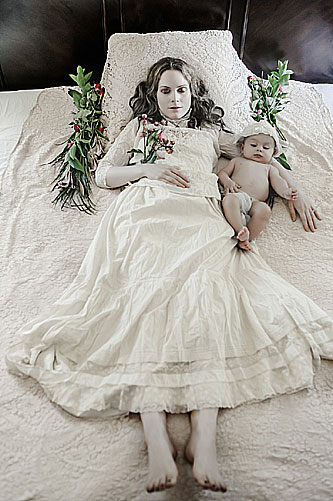 (Extra)Ordinary
Life
(Extra)Ordinary
Life
This is your last chance to be someone else
This is your last dance before your sun goes out
You better hurry up before your doors close
You better hurry, hurry
Each day is deadening, just like the one before
You keep on pushing down ‘til you can’t feel at all
Why don’t you break on through to who you really are?
Instead of lying, lying
CHORUS
No one can save you from your ordinary life, but you
If you were meant to lead an extraordinary life, then do
So scared of failing everybody else
Now you’re the only one who doesn’t trust yourself
Do you know what you want, if you could even try?
You’re only dying, dying
CHORUS
BRIDGE
Would you trade a hundred years, a sea of tears
To be alive for just one night?
Open your eyes and see the sky
mwe3: How would you describe your music? It always sounded to me like
you were very influenced by artists like Bowie but being that your
debut album came out in 2000, you are truly a 21st century artist.
What musical, cultural and artistic influences would you say are some
of your biggest, both as a composer and as a musician / performer?
MICHAL: I call my genre “Alternative Torch” because
I was very influenced by the alternative rock bands that were popular
when I was a teenager, but I also have a bluesy/jazzy streak to me.
I am pretty insulated when it comes to new music—I don’t
listen to the radio or go out to shows much, I think  because
I am usually disappointed. For me, finding a new artist that I like
is like falling in love—the chemistry has to be just right. Because
of that I find myself going back to the well of the same artists I
loved as a kid, and they still hold up. My parents played the Beatles,
the Stones, Peter, Paul and Mary, the Carpenters, Billy Joel, and
Elton John, so that is a part of my lexicon. Then I started studying
classical piano when I was six, so I got heavily into Beethoven, Chopin
and Bartok—that definitely comes in when I write on the piano.
When I was 13 I got into Nirvana, and Nine Inch Nails, and later I
discovered Elliot Smith, Fiona Apple and glam rock, like Bowie and
T-Rex. Those are the “Pantheon” for me. But I also get a
lot of inspiration from fiction—I love the writing of Kazuo Ishiguro,
Donna Tartt, Anne Rice, to name a few, including YA novelist Barbara
Morgenroth and blogger/up and comer Una LaMarche, and visual art inspires
me too—I love the Renaissance artists and the German Expressionists.
My parents are both visual artists and they have been taking me to
galleries since I was a baby.
because
I am usually disappointed. For me, finding a new artist that I like
is like falling in love—the chemistry has to be just right. Because
of that I find myself going back to the well of the same artists I
loved as a kid, and they still hold up. My parents played the Beatles,
the Stones, Peter, Paul and Mary, the Carpenters, Billy Joel, and
Elton John, so that is a part of my lexicon. Then I started studying
classical piano when I was six, so I got heavily into Beethoven, Chopin
and Bartok—that definitely comes in when I write on the piano.
When I was 13 I got into Nirvana, and Nine Inch Nails, and later I
discovered Elliot Smith, Fiona Apple and glam rock, like Bowie and
T-Rex. Those are the “Pantheon” for me. But I also get a
lot of inspiration from fiction—I love the writing of Kazuo Ishiguro,
Donna Tartt, Anne Rice, to name a few, including YA novelist Barbara
Morgenroth and blogger/up and comer Una LaMarche, and visual art inspires
me too—I love the Renaissance artists and the German Expressionists.
My parents are both visual artists and they have been taking me to
galleries since I was a baby.
mwe3: Would you describe yourself as being an international
artist? How big an influence is Israeli music and Jewish culture on
your music and what was it like visiting Israel this past year? I
loved your version of the “Hatikva”. What does that song
say to you?
 MICHAL:
Israeli culture is a big part of my identity. Both my husband and
I were born in Israel and moved to the states when we were babies,
and we got married in Israel as well. Most of my husband’s family
still lives there, and we try to visit regularly. We took Dashel last
December and he met his two cousins, and spent time with his great
grandmother, who is in her eighties and a holocaust survivor, so it
was a very meaningful trip. Israel is such a beautiful country, full
of history, and it is a spiritual Mecca for many religions. I always
feel spiritually renewed when I visit.
MICHAL:
Israeli culture is a big part of my identity. Both my husband and
I were born in Israel and moved to the states when we were babies,
and we got married in Israel as well. Most of my husband’s family
still lives there, and we try to visit regularly. We took Dashel last
December and he met his two cousins, and spent time with his great
grandmother, who is in her eighties and a holocaust survivor, so it
was a very meaningful trip. Israel is such a beautiful country, full
of history, and it is a spiritual Mecca for many religions. I always
feel spiritually renewed when I visit.
I’m not a great authority on Israeli music. On this last trip,
I performed at the Barby, which is kind of an institution in Tel Aviv.
An Israeli artist, Adi Madanes, who I randomly met when I was playing
a public piano on the streets of New York a few years ago, invited
me to appear as a guest star. He is wonderful, generous, talented
guy.
“HaTikva” means never giving up in the face of adversity.
That’s a pretty universal message that I think anyone can relate
to.
mwe3: How has your music changed over the years? Is the Michal
of One Immortal Day the same person as the one that recorded
Sky With Stars for Columbia back in 2000? How have you grown
as an artist and how, in your estimation, has the music world changed
over the years? Is it a better, friendlier place for you and other
independent artists now or then and who are some of your favorite
current artists?
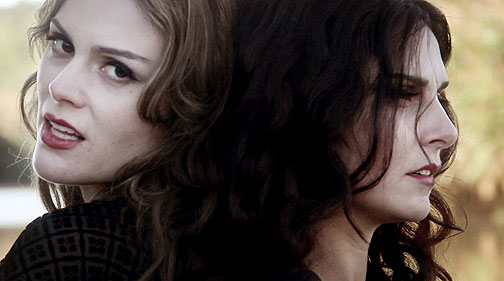 MICHAL:
I am the same person, with slightly improved social and decision making
skills (lol). I think lyrically I used to write much more abstractly,
and now I don’t have time for any of that—I don’t appreciate
BS and obfuscation from other people, so I tried to be especially
honest and direct on this record. I had a ton of songs that I could
have recorded, and I tried to let go of any emotional attachment I
had in the selection process. I wanted this record to be only the
most catchy, relatable pop songs I could write.
MICHAL:
I am the same person, with slightly improved social and decision making
skills (lol). I think lyrically I used to write much more abstractly,
and now I don’t have time for any of that—I don’t appreciate
BS and obfuscation from other people, so I tried to be especially
honest and direct on this record. I had a ton of songs that I could
have recorded, and I tried to let go of any emotional attachment I
had in the selection process. I wanted this record to be only the
most catchy, relatable pop songs I could write.
When I was on Columbia, everything was a black box—artists were
encouraged to just be artists and leave everything else to the professionals.
Now you can do everything yourself. We made this record in Jamahl’s
apartment on a shoestring budget, and I am deeply involved in every
step of the process—recording, music videos, marketing, gigging,
radio, promotion. It’s a beautiful thing.
mwe3: What other musicians and artists are with you on One
Immortal Day and who else aided and abetted you in the writing,
recording and release process?
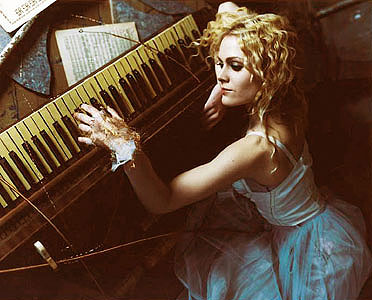 MICHAL:
Jamahl Richardson produced, arranged and engineered One Immortal
Day and played a lot of the instruments. I worked with Jamahl
on a modern remake of “The Baseball Song”, written by W.J.
Bullock in 1874, for a documentary on one of two female groundkeepers
in the history of baseball, called Diamond’s Are A Girl’s
Best Friend (2011). So, I knew he was super talented, and I wanted
to work with him again. He was producing a rapper, Jake Lef, at the
same time, so I would hear tracks from his album Mirror Mirror
playing when I came to the studio. Jake has a great voice and a very
positive message, so when he offered to rap on a few of my tracks,
I jumped at the opportunity, and I’m very happy with the result.
Jamahl brought in a few session players to add some analog warmth:
Takahir “Moro” Morooka on live bass, and Lily Henley and
Jie-song Zhang on live violins. In my live shows I am now working
with an 18 year old violinist who is truly a phenom—Arielle Korman
Rivera. My husband, Yaron, has been helping me market this album,
and my sister in law, Rinat, and my son, Dashel, costarred in the
music video for “Vampire” with me, so it has truly been
a family affair. We’ve hired Rive Video to promote the music
video, and we are working with Planetary for the radio campaign.
MICHAL:
Jamahl Richardson produced, arranged and engineered One Immortal
Day and played a lot of the instruments. I worked with Jamahl
on a modern remake of “The Baseball Song”, written by W.J.
Bullock in 1874, for a documentary on one of two female groundkeepers
in the history of baseball, called Diamond’s Are A Girl’s
Best Friend (2011). So, I knew he was super talented, and I wanted
to work with him again. He was producing a rapper, Jake Lef, at the
same time, so I would hear tracks from his album Mirror Mirror
playing when I came to the studio. Jake has a great voice and a very
positive message, so when he offered to rap on a few of my tracks,
I jumped at the opportunity, and I’m very happy with the result.
Jamahl brought in a few session players to add some analog warmth:
Takahir “Moro” Morooka on live bass, and Lily Henley and
Jie-song Zhang on live violins. In my live shows I am now working
with an 18 year old violinist who is truly a phenom—Arielle Korman
Rivera. My husband, Yaron, has been helping me market this album,
and my sister in law, Rinat, and my son, Dashel, costarred in the
music video for “Vampire” with me, so it has truly been
a family affair. We’ve hired Rive Video to promote the music
video, and we are working with Planetary for the radio campaign.
mwe3: Can you say something about how, where and when One
Immortal Day was written and recorded and also something about
the recording process, for instance was there a lot of overdubbing
and what instruments did you play mostly on the album? Can you say
something about your favorite instruments, guitar, and keyboards?
MICHAL: One Immortal Day was recorded during six months
of Fridays in Jamahl Richardson’s apartment in Bed Stuy. I brought
the songs to Jamahl and I would record a scratch vocal and either
a guitar or a piano track. Then Jamahl would work his alchemy and
bring me a rough sketch of the track, I’d say yay or nay on the
direction of the production, and he’d continue to build the track
based on my feedback. Overdubs were minimal—predominantly harmonies.
I played acoustic and electric guitar, and keyboard, but Jamahl played
a lot of keyboards too, and he even taught himself some basic guitar
chords to play on the Reggae version of “Pins and Needles.”
 I am definitely
not a techie in terms of equipment. I have two custom Gibson’s—a
hollow body Les Paul electric and a CL40 acoustic, which are my tools
of the trade. I also have a junky Ibanez from high school which has
a nice, trashy, distorted sound. At home I record on a Roland A-90
keyboard, and I have a beautiful 1927 Pleyel baby grand piano, which
I write on. I have a home studio, but I won’t go into all that
because it will make your brain fall asleep.
I am definitely
not a techie in terms of equipment. I have two custom Gibson’s—a
hollow body Les Paul electric and a CL40 acoustic, which are my tools
of the trade. I also have a junky Ibanez from high school which has
a nice, trashy, distorted sound. At home I record on a Roland A-90
keyboard, and I have a beautiful 1927 Pleyel baby grand piano, which
I write on. I have a home studio, but I won’t go into all that
because it will make your brain fall asleep.
mwe3: Can you contrast the One Immortal Day album with
your 2011 CD MagiCat in as far as the mood and choice of music
you feature on both albums? It seems like MagiCat had a much
lighter kind of approach.
MICHAL: MagiCat was a side project that I wrote with
Dave Liang of the Shanghai Restoration Project (SRP) and Sean Han
of Blip Blip Bleep, and which was produced by Dave Liang. I had worked
with Dave a few times before—I sang on SRP’s album Story
Of A City on the track “Pace of Light,” and “Toyland”
on “Undercover Christmas.” Dave is a brilliant writer and
producer, and the whole experience was quite novel and fun for me.
Dave, Sean and I got together in Dave’s apartment in Chinatown
and had two crazy writing sessions. Then we recorded the whole album
in two weeks.
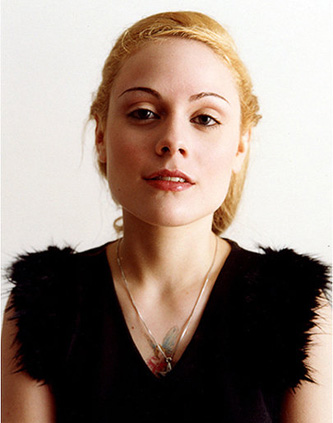 The
concept of the album was “Where does the Cheshire Cat go when
he leaves Wonderland?” It’s all about his adventures when
he goes back up the rabbit hole. We got this award-winning Israeli
illustrator, Nimrod Levin, to make a great animated video of MagiCat’s
adventures.
The
concept of the album was “Where does the Cheshire Cat go when
he leaves Wonderland?” It’s all about his adventures when
he goes back up the rabbit hole. We got this award-winning Israeli
illustrator, Nimrod Levin, to make a great animated video of MagiCat’s
adventures.
I wasn’t writing as myself, I was this MagiCat character,
so that freed me from some of my angsty headiness—plus Dave brought
a really light, playful aesthetic to the whole thing.
The endeavor was very successful—the song “MagiCat”
appeared in a Canon camera commercial campaign in the U.S. and Canada,
as well as spots for Rdio, Sonos and the Warren Miller film Like
There’s No Tomorrow, which is apparently a big deal in the
extreme skiing world. Plus the album and song reached the top 20 on
Japan iTunes electronic, so we were pretty pleased.
mwe3: Are you still active in teaching music and what other
things keep you busy throughout the day? Can you say something about
your work as a soundtrack composer and what are some of your latest
works in that area?
MICHAL: Over the summer I taught some piano and vocal lessons,
but since then I’ve been focused on the album and being a mom.
Since my stint with One Life To Live, I haven’t actively
pursued soundtrack work, but sometimes a project comes along that
I am inspired by and it just works out. I recently provided the soundtrack
for a documentary on the Twilight phenomenon, called Into The Twilight
Haze. Often a film or TV show will license one of my already existing
songs without me writing to the program itself. For example, I contributed
a song to the upcoming documentary A Castle In Brooklyn, King Arthur
about the forced evictions of Arthur Wood, his wife and children from
their iconic building in Brooklyn, Broken Angel.
mwe3: How has becoming a mother impacted you musically and
otherwise? Do you think your son will become a musician in the years
to come?
MICHAL: My mom stayed home with me and my sister, and it’s
important to me provide that kind of personal attention to my kids.
So my days are pretty full with Dashel. I have much less time to be
inside my own head and think about my feelings, because I want to
be present with him, so my writing opportunities are precious and
rare. On the positive side, motherhood has made me much more appreciative,
emotional, and intuitive, and much less selfish, judgmental, and impatient,
which are all good things for my art.
I hope that Dashel will be a musician. I performed at Don Devito’s
memorial service on the same stage as Billy Joel and Roseanne Cash
days before I gave birth to him, and I played piano when I was in
labor with him, so I think music is part of his DNA. He certainly
enjoys singing and banging on the piano and drums. But I will encourage
him wherever his talents and interests lie.
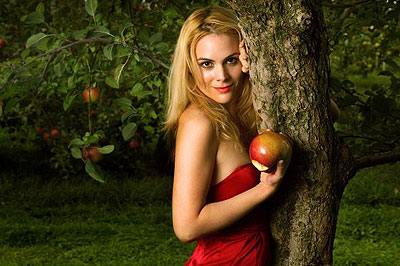 mwe3:
Why did you choose to cover the Leonard Cohen song “Dance Me
To The End Of Love”? How did you find his music?
mwe3:
Why did you choose to cover the Leonard Cohen song “Dance Me
To The End Of Love”? How did you find his music?
MICHAL: Last year a good friend of mine from law school, Mainon
Schwartz, asked me to sing “Dance Me To The End Of Love”
at her wedding to Kevin Flatley. I’d never heard the song before,
but I immediately loved it—when I read that the inspiration for
the song came from classical musicians being forced by the Nazis to
play while their fellow concentration camp prisoners were being led
to the crematoria—that really resonated with me. Five weeks after
their wedding, Mainon’s husband was killed. He was a sergeant
in the military and he was recently deployed to Afghanistan. They
have such a beautiful, tragic love story, and the song embodies that
bitter sweetness.
mwe3: What plans do you have for One Immortal Day moving
forward and how about other plans you have for 2013 and beyond? Will
there be a much waited for Michal Towber box set? (I hope) Thank you
for this interview.
MICHAL: We had a very successful album release party at Stage
72 in New York City last month, and we are currently booking more
gigs. We are running a music video promotion campaign and a college
and independent radio campaign. I’m also pregnant again (due
in July), so that will obviously impact my plans this year.
Hmm, I’ve never considered releasing a box set—maybe when
I am 80 and releasing my 80th CD! Thank YOU for the interview!
Thanks to Michal Towber Prywes @ www.MichalMusic.com



